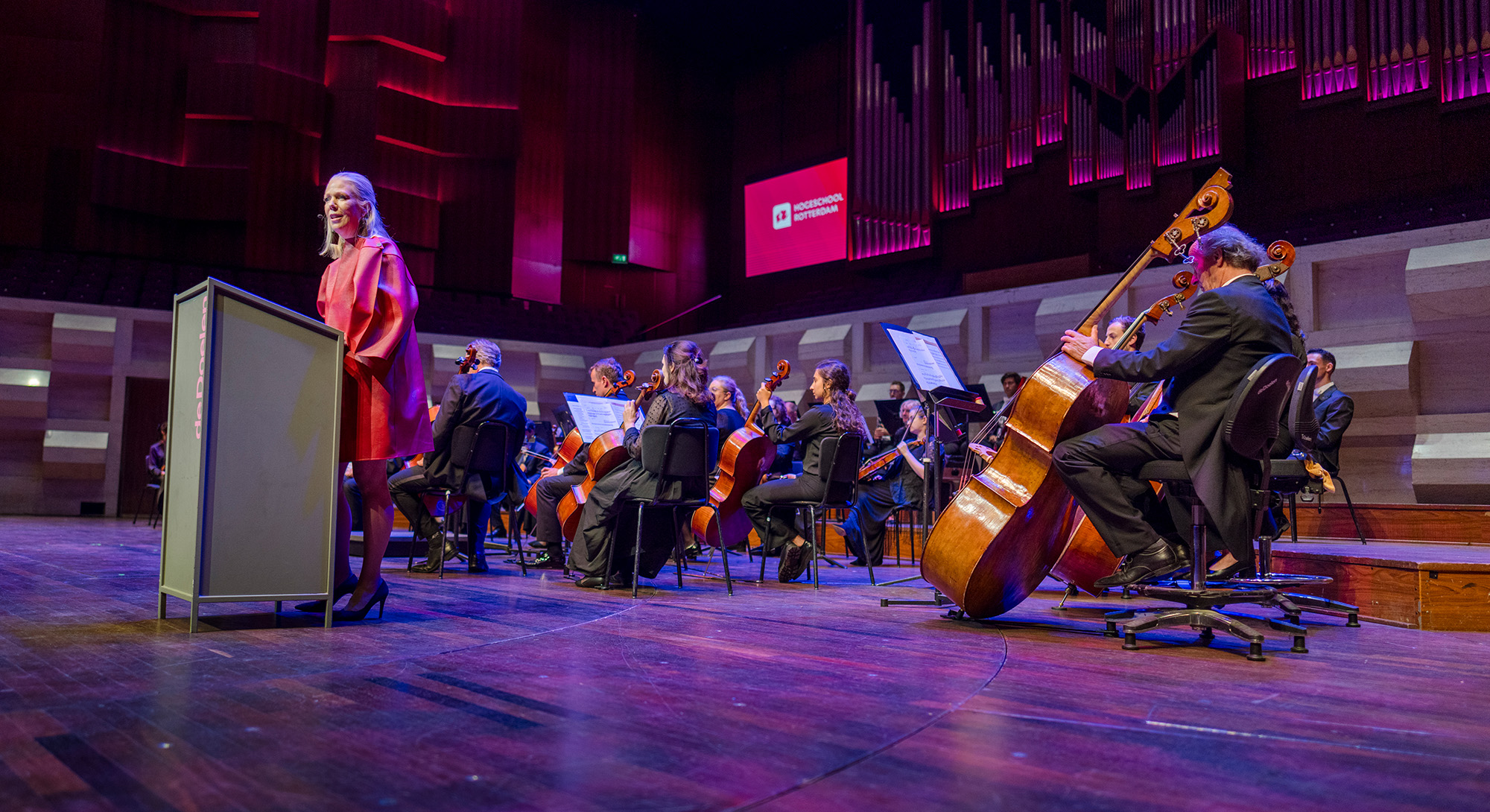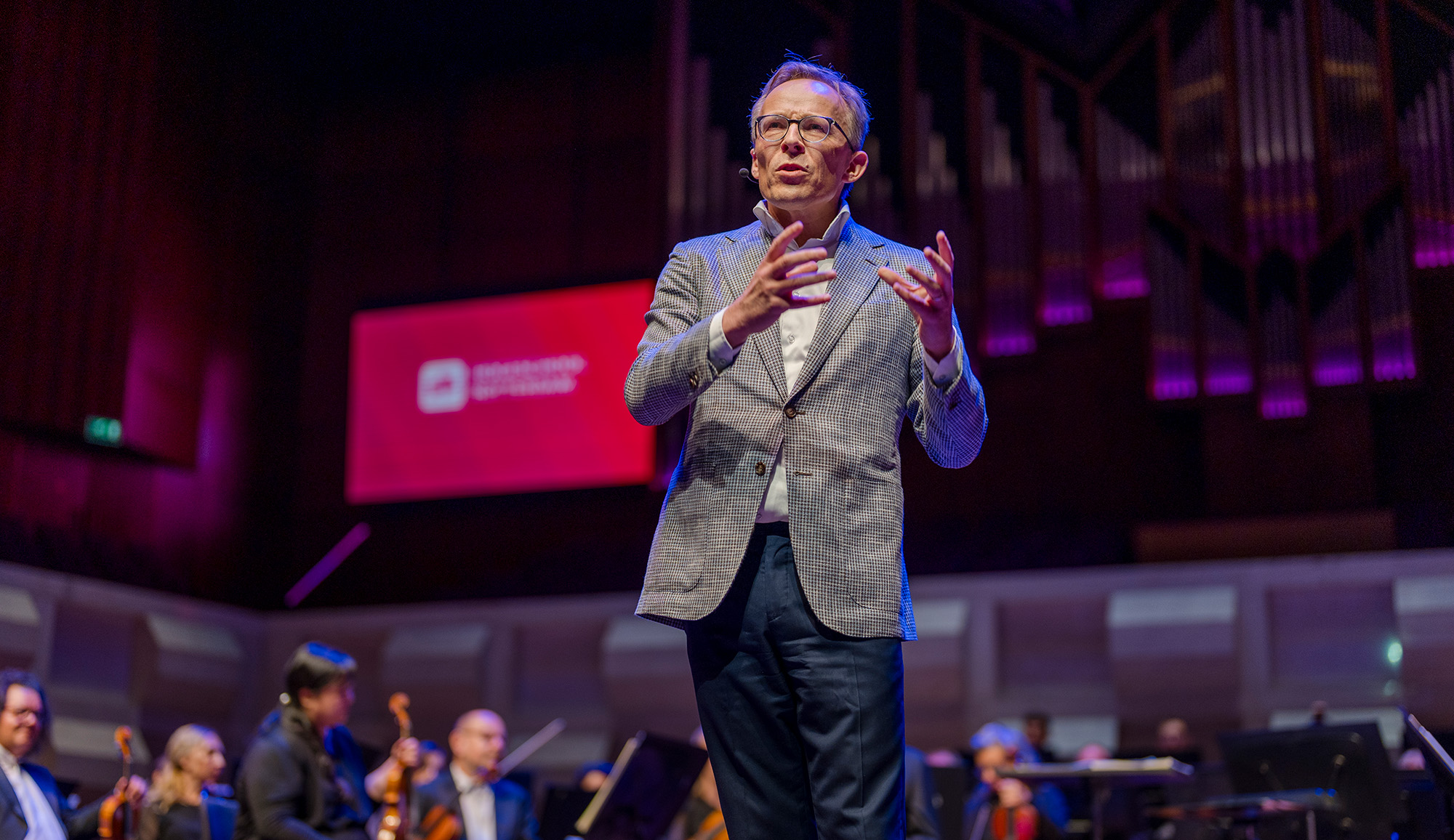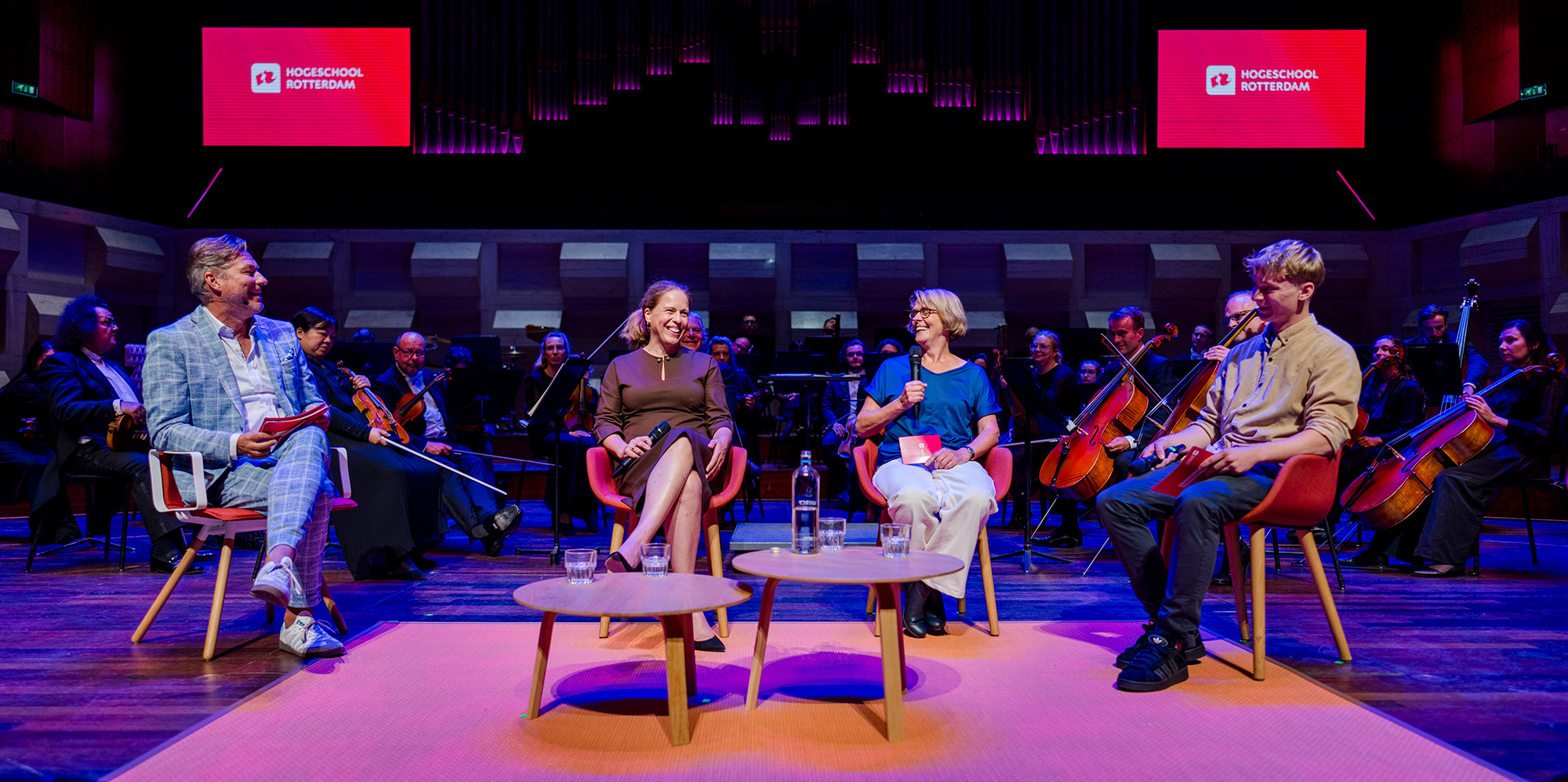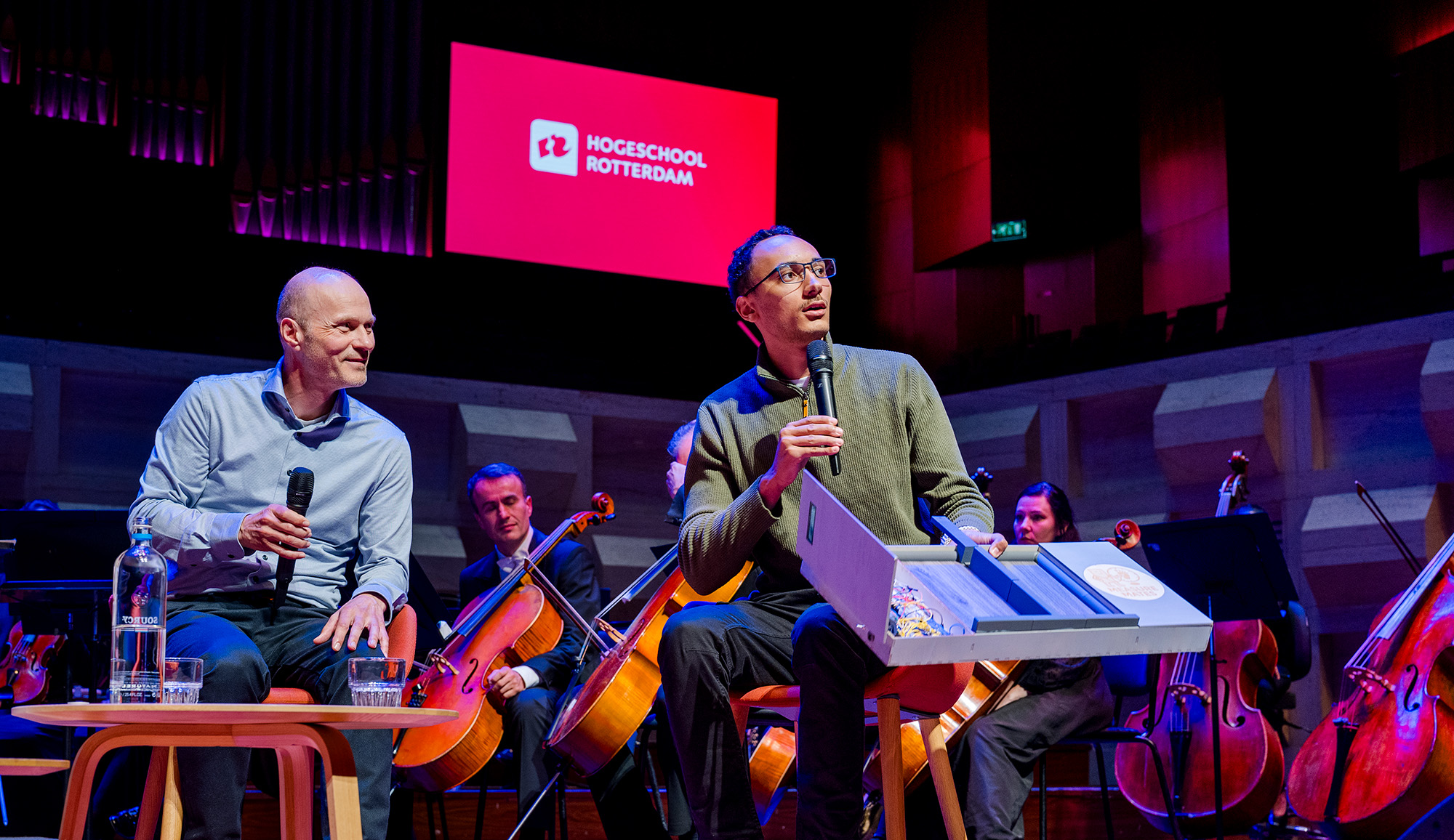“This is such a proud moment!” Introductory words spoken by Sarah Wilton-Wels, Executive Board Chair. Presenter Sander de Kramer welcomed her as she took to the stage. For the occasion she was wearing a dress designed by Willem de Kooning student Sahar Khazaei. Sarah continued, “We’ve got so much positive news. Before the summer, we successfully completed the Institutional Accreditation and Audit. The review committee gave us wonderful compliments, such as praising our commitment, curiosity and critical attitude. In their opinion we do not problematise standardisation; we are curious about research from an educational perspective and vice versa; and we put our students first when it comes to pedagogy and didactics. I am looking forward to the official report from the Accreditation Organisation of the Netherlands, which will, of course, also contain areas for improvement. It is quite the achievement. I am proud of it and everyone else can be too!”
More than educational quality
“Good education is more than simply providing educational quality, so I stand here with pride but also with concern,” she continued. She shared three examples to illustrate her point: the multitude of ICT systems for our students, suboptimal schedules, and restricted access to the school buildings during the summer. These are just some of the issues that cause concern. “We play a formative role in the lives of young adults. We must guide our students, and aspiring students too, both literally and figuratively. That is what education is all about. In this regard, we at Rotterdam University of Applied Sciences have some catching up to do. We owe this to our students, our partners, and ourselves.”

That is why Sarah concluded with a call to work together and focus on what is best for our students. “That genuine focus on our students, in addition to our excellent educational quality, improves our institution as a whole. The orchestra behind me illustrates this better than anything else could. An orchestra is not just about the individual qualities of the musicians or the instruments. It's about the whole.”
In order to further improve performance, Rotterdam University of Applied Sciences will continue to develop. “We are doing so by organising larger, comparable units where we will continue to build on strengthening education and research in terms of knowledge domains, thereby becoming even more relevant.”
National academic year
Following the opening speech, Maurice Limmen, Chairman of the Netherlands Association of Universities of Applied Sciences, launched the academic year. He explained that the higher education sector would be focusing on the transition from vocational to higher education in the coming year. This transition is important to improve because it is associated with relatively high dropout rates and low success rates for students and programmes. With the upcoming parliamentary elections in sight, Maurice appealed to our politicians. “Higher professional education is essential for the future of the Netherlands. Therefore, all students, regardless of their background, must be given every opportunity in society. See our students for who they are. Recognise the value of education and research at universities of applied sciences. Recognise the value of higher professional education. If a politician has that understanding, they will also realise how carefully it should be managed, and why investment in higher education is needed right now.”

Future Makers awards
Then the awards ceremony began, starting with the presentation of the Future Makers Awards and the Future Makers Grant. These awards are presented annually by a jury to projects that involve collaboration between education, research and the professional field on at least one of the four social challenges. There is an award for each of the four challenges that Rotterdam University of Applied Sciences is working on: Sustainable Delta, Vital Community, Smart & Social City, and Future-proof Economy.
The selected projects exemplify the institution’s Talent for Transition: students who contribute to solutions for urgent issues such as pressure on healthcare, antibiotic resistance, the accessibility of government websites and carbon-neutral construction.

Future Makers Grant
In addition to the Future Makers Awards, the Future Makers Grant was presented. This grant is for an honours programme student who has with special plans for the future. The grant enables recipients to get off to an ambitious start. This year's Future Makers Grant goes to Stijn Herpers for his Man Up Club initiative. It is a safe space where men, regardless of their social, financial, or cultural background, can come together, open up, speak honestly, and support each other. It is a wonderful example of social entrepreneurship in practice.
Equal opportunities in education and the city
The contributions made by RUAS and its students to finding solutions to social challenges were discussed in the talk shows, in which Sander de Kramer conversed with guests. And not just any guests! For the first round, themed 'Vital Community', Mayor Carola Schouten was joined by Mariëtte Lusse, professor Child Poverty and Working with Parents, and Social Work student Gijs Griffioen.
Together, they discussed the city's integrated approach to child poverty – a collaboration between the municipality, RUAS, practical organisations, and experts by experience. This collaboration has led to the launch of the Child Poverty research programme, in which social workers learn to work more effectively with families in poverty.

One example of this is the collaboration with the House of Hope, which student Gijs is involved with. This collaboration bridges the gap between practice-oriented research, education, and direct neighbourhood impact.
Mayor Carola Schouten emphasised the importance of education in fostering a vibrant community. According to her, these are places in the city where people look out for each other and opportunities are provided. Take our university of applied sciences, for example. “During my previous visit here, a student told me that she had been in youth care for a long time and had hardly attended school during that period. She said that she could now pick up where she left off, studying at her own pace and in her own way. She also said that she had gained the perspective needed to work towards something again. That made a big impression on me. Education is so much more than just cramming and memorising. It really matters.”
Music lesson about collaboration
Sinfonia Rotterdam demonstrated the importance of collaboration by creating a cacophony of sound. It became clear that Beethoven's Fifth is impossible to play without careful planning, responsibility and leadership. “To work well together, you have to be able to trust each other, establish and maintain contact, take responsibility, and be willing to express your emotions,” said conductor Conrad van Alphen. With the help of the audience, a more successful mini-performance of the piece followed.
Making time-consuming measurements smarter and more social
The second talk show, with the 'Smart and Social City' theme, focused on a unique collaboration between the Sophia Children's Hospital and students from six different programmes of study. RUAS leading lecturer Ronald van Gils, paediatrician Dr Daniëlle van der Kaay (Erasmus MC) discussed the measuring mat of Applied Data Science and Artificial Intelligence student Leyton Sijpkens.

Sophia Children's Hospital treats many children with rare growth disorders, who often have to travel long distances several times a year for reliable height measurements. This is time-consuming for parents, puts extra pressure on the hospital, and is challenging for the children because so much depends on their measurements. However, there is another way: a smarter, more digital solution that is closer to home. Take Leyton's innovative measuring mat, for example. Once this mat has been further developed, patients will be able to take their own measurements at home, reducing the number of hospital visits they need to make. This will be valuable for both patients and healthcare providers.
The stage part of the event concluded with a performance by singer Renske Taminiau, a student at Rotterdam University of Applied Sciences. Together with Sinfonia Rotterdam, she sang 'You'll Never Walk Alone'. And, of course, she didn't perform alone — the entire audience sang along.
